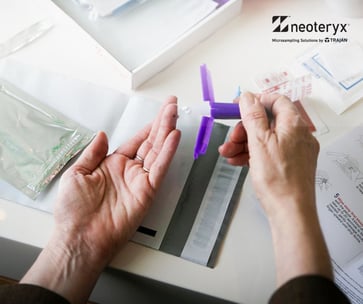Share this
Neoteryx's Mitra Blood Collection Device Registered With TGA in Australia
by Neoteryx Microsampling on June 22,2020
Los Angeles, USA & Canberra, AUSTRALIA — The Mitra® microsampling device from US company Neoteryx has been registered as a Class I in vitro diagnostic (IVD) medical device with the Therapeutic Goods Administration (TGA) in Australia. Designed for remote use, Mitra devices enable anyone to collect their own blood at home with a simple finger-stick method. The Mitra device is based on volumetrically absorptive microsampling (VAMS®) technology, which enables a scientifically precise volume of blood to be collected on its absorbent tip.
 Doctors, researchers and labs in Australia can send Mitra devices and Mitra Blood Collection Kits to patients or clinical trial participants who must stay safe at home or who live in remote areas. A key advantage of Mitra is that no visit to a clinic or phlebotomist for a blood draw is necessary—this easy-to-use device collects a high-quality blood sample for accurate, validated lab testing for clinical diagnostics that inform decisions about medical treatment.“With the TGA registration, Mitra microsampling devices and Mitra Blood Collection Kits from Neoteryx can be imported into Australia for use in both research and clinical diagnostic applications,” said Loc Huynh, MS, RAC, Regulatory Affairs and Quality Director, Neoteryx.
Doctors, researchers and labs in Australia can send Mitra devices and Mitra Blood Collection Kits to patients or clinical trial participants who must stay safe at home or who live in remote areas. A key advantage of Mitra is that no visit to a clinic or phlebotomist for a blood draw is necessary—this easy-to-use device collects a high-quality blood sample for accurate, validated lab testing for clinical diagnostics that inform decisions about medical treatment.“With the TGA registration, Mitra microsampling devices and Mitra Blood Collection Kits from Neoteryx can be imported into Australia for use in both research and clinical diagnostic applications,” said Loc Huynh, MS, RAC, Regulatory Affairs and Quality Director, Neoteryx.
Blood samples collected with Mitra are protected in a cartridge and a sealed bag within an envelope for mailing directly to a designated lab or health facility through regular post. Mitra dried blood samples have many applications in healthcare such as serology testing, therapeutic drug monitoring, addiction recovery testing, and managing chronic illnesses such as diabetes or cardiovascular disease. Mitra microsamples are ideal for telehealth, pediatric care, remote patient monitoring for vulnerable patients or those participating in virtual clinical trials and public health studies.
“Patient-centric blood collection at home using Mitra devices is more relevant than ever during the coronavirus pandemic, because in-clinic blood draws and wellness visits pose a risk of exposure to the virus,” said James Rudge, PhD, Technical Director at Neoteryx. “Physicians find Mitra microsampling extremely useful for remote patient monitoring of their vulnerable patient populations.”
Many clinical and lab practitioners prefer Mitra devices versus other blood microsampling options, such as dried blood spot cards, due to their user friendliness, quantitative nature, and compatibility with installed laboratory instrumentation for high throughput processing.
About Neoteryx
Neoteryx LLC, a medical device company in Southern California, delivers simple, quantitative and automatable microsampling solutions. Its Mitra Microsampler, an FDA-registered Class 1 exempt medical device, facilitates remote specimen collection and transportation of blood and other biological fluids to improve human welfare, reduce laboratory costs and enable new models of care. Neoteryx’s customers include scientific researchers, laboratories and healthcare providers working to advance telehealth, personalized medicine, pharmaceutical development, biotechnology research and clinical diagnostics. For more information, visit www.neoteryx.com.
Find more microsampling resources in our Technical Resource Library:

Image Credits: Neoteryx, TGA Australia
Share this
- Microsampling (41)
- Industry News, Microsampling News (37)
- Mitra® Device (34)
- Company Press Release, Product Press Release (22)
- Research, Remote Research (18)
- Infectious Disease, Vaccines, COVID-19 (15)
- Clinical Trials, Clinical Research (14)
- Biomonitoring, Health, Wellness (10)
- Blood Microsampling, Serology (10)
- Decentralized Clinical Trial (DCT) (8)
- Omics, Multi-Omics (7)
- Venipuncture Alternative (6)
- Skin Microsampling, Microbiopsy (5)
- Harpera Device (3)
- Specimen Collection (3)
- Toxicology, Doping, Drug/Alcohol Monitoring, PEth (3)
- Pharmaceuticals, Drug Development (2)
- Therapeutic Drug Monitoring, TDM (2)
- Antibodies, MAbs (1)
- Environmental Toxins, Exposures (1)
- Preclinical Research, Animal Studies (1)
- hemaPEN® Device (1)
- February 2026 (1)
- January 2026 (1)
- December 2025 (1)
- May 2025 (1)
- April 2025 (1)
- February 2025 (4)
- September 2024 (1)
- August 2024 (1)
- May 2024 (2)
- January 2024 (1)
- December 2023 (2)
- November 2023 (3)
- October 2023 (2)
- September 2023 (1)
- August 2023 (3)
- July 2023 (3)
- June 2023 (1)
- May 2023 (2)
- April 2023 (1)
- March 2023 (2)
- February 2023 (1)
- January 2023 (2)
- December 2022 (1)
- November 2022 (1)
- October 2022 (2)
- August 2022 (1)
- April 2022 (1)
- February 2022 (1)
- January 2022 (1)
- December 2021 (1)
- November 2021 (1)
- October 2021 (2)
- September 2021 (1)
- August 2021 (2)
- July 2021 (2)
- June 2021 (2)
- April 2021 (1)
- March 2021 (2)
- February 2021 (1)
- January 2021 (1)
- December 2020 (1)
- November 2020 (1)
- October 2020 (1)
- September 2020 (2)
- August 2020 (3)
- July 2020 (3)
- June 2020 (2)
- May 2020 (1)
- April 2020 (3)
- October 2019 (1)
- March 2019 (1)
- January 2019 (1)
- November 2018 (1)
- August 2018 (1)
- July 2018 (1)
- June 2017 (1)
- April 2017 (1)
- March 2017 (1)
- February 2017 (1)
- May 2016 (1)
- December 2015 (1)
- October 2015 (1)
- August 2015 (1)
- August 2014 (1)
- July 2014 (1)


Comments (1)